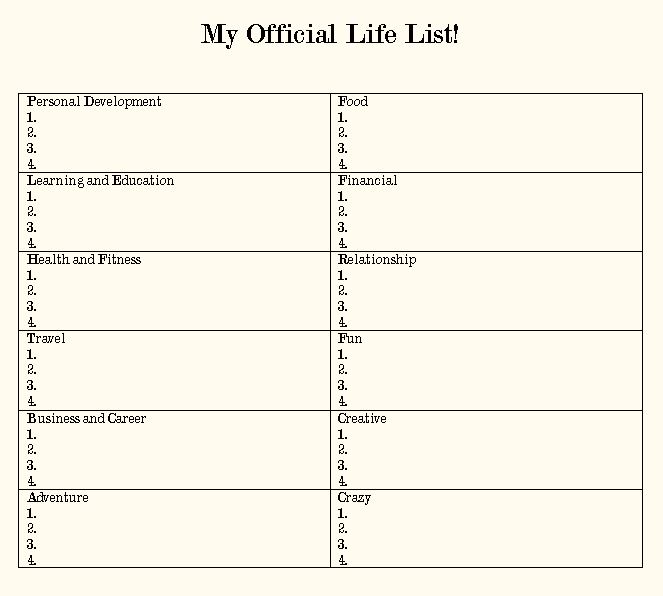By Michael Trickey, author of Finding Home Over 50: Achieving Your Housing Needs and Life List Dreams in Retirement
Establish Your Life List
“Some of the world’s greatest feats were accomplished by people not smart enough to know they were impossible.”
–Doug Larson
You are likely familiar with the term “bucket list” or, as I prefer to call it, “life list”, and may have a vague notion of what is on our own list. Few of us have actually taken the time to sit down and write one out. As an initial step in planning for your retirement years, this article walks you through the steps to formally create your bucket list or life list now. As you do, you will begin to clearly see that the items listed will have a big bearing on where and how you ultimately decide to live.
For instance, what if you want to get a college degree? Can you do this online, or would you need to move to a town with post-secondary schools? What if you want to learn to speak Spanish fluently? You might want to move to Barcelona for a couple of years. Or perhaps you want to become a master fisherman?Maybe you want to move close to an ocean or lake, or live on a houseboat.

While a couple of items for your life list may pop into your mind right away, the next section provides a few suggestions and some questions to help you, along with some websites you can peruse that are devoted to helping people create their life lists.
Suggestions for Creating Your Life List
Many people and websites talk about a life list as if it is a dream list. In a sense it is, but it goes well beyond that. A life list is a list of dreams that you strive to actually make come true. Think of it as a list of intentions, not simply wishes. The act of writing your list has a powerful impact on your mind; writing your list with emotion and intention magnifies that power many times over.
Do not be afraid to initially write down everything that pops into your mind. Brainstorming will get your mind going, creating a flow. Brainstorming will get your mind going, creating a flow. Capture everything for now, no matter how mundane. Then go back and consider each item and your true intentions to whittle down your list.
When editing your list, you might want to create a personal theme that defines what your life will be` and set goals around it. Ask yourself what you would like your life to look like over the next few years. Establish a vision, and make that your theme. Once you have your theme, you can focus and prioritize your goals.
For each item that stays on your refined list, identify a timeline for achievement. Start with goals for this year and progress outward. Pick at least one item you can do rather quickly, and do something today towards achieving it.
Some items may have no defined timeframe, but setting one helps your subconscious and conscious mind focus. It is like cramming for an exam. When we set deadlines, we are more apt to get things done. Make sure that you factor in required physical endurance and mobility so that you can target to achieve the more strenuous items while younger.
Categorize your list into general areas of life, big and small goals, and include variations of each goal that are more and less difficult.
Some general area of life categories for goals may include:
- Personal Development
- Learning and Education
- Health and Fitness
- Travel
- Business and Career
- Adventure
- Food
- Financial
- Relationship
- Fun
- Creative
- Crazy

As you write items within each life category, make them engaging with action words. Include on your list things you can do for very little money and without needing to travel, as well as those that might be more expensive or extravagant.
For the more involved items, think through progressive levels of challenge, complexity, or achievement. For instance, let’s say you put “attend a professional sporting event” on your list. You might include:
- Go to a professional football game at the stadium of my favorite team
- Go to a professional football game at the stadium of every team in my favorite team’s division
- Go to a playoff game
- Go to the Super Bowl
You can do the same sort of tiering with practically anything. Your variations could progress from watching a local theater production to flying to New York and seeing a Broadway musical. You could start with learning a favorite recipe as an easy variation and end with becoming a trained chef as the difficult variation. You get the idea.
Write your list in a personal manner that reflects your personality, interests, idiosyncrasies, and quirks. Go beyond the typical list items. Do not restrict yourself because you are worried about how others will react. Do not leave off items that at first glance may seem to be unachievable. You may not fully achieve some items on the list, but that is okay. There are no bucket list police watching you. If you want to achieve something, then write it down. Remember, the act of doing so sends a powerful message to your brain, and your odds of success instantly go up.
Self-Reflection Questions to Stimulate Ideas for Your Life List
Here are some self-reflection questions that may stimulate your mind for coming up with ideas for your life list.
- What person or people would you like to meet?
- What places would you like to visit?
- What would you like to do while you are at each of the places?
- What skillsets would you like to learn?
- What challenges would you like to overcome?
- Are there life list goals that you have considered but not pursued because you think you would be embarrassed if anyone knew about them?
- Is there something that you use, enjoy, or consume that you would like to know how to produce? For instance:
- Music;
- Art;
- Books;
- Movies;
- Types of food;
- Restored classical cars?
- What are you doing when you imagine yourself as:
- Relaxed;
- Happy;
- Awestruck;
- Excited?
- Is there anything in your life about which you were once very passionate, but stopped exploring as you grew older?
- Music;
- Art;
- Books;
- Movies;
- Types of food;
- Restored classical cars?
- Relaxed;
- Happy;
- Awestruck;
- Excited?
Some Sources of Ideas for Your Life List
Many websites are devoted to bucket list and life list ideas. For instance, check out:
Or just search for “bucket list” or “life list” using your favorite Internet search tool.
Suggestions for Achieving Items on Your Life List
Make your list official. Pick a format that works for you: pen and paper, word processor, white board and markers, smartphone, or whatever you like. Decorate your background, use fancy print, draw and paste pictures of your goals on it, put the word “Official” at the top, or do whatever you think gives it a feeling of being special. This is your custom, personalized life list.
Once your list is designed and completed to your liking, put it in a prominent place where you will see it every day. It now represents your life, not a side project.

The official list should only include the items you intend to make reality. Set tests for what stays on the official list and what does not. For instance, for each item, ask yourself:
- Am I doing this because I want to experience it, or simply because I want to say I have done it?
- Will I realistically invest the amount of time, money, and energy this will require to make this happen?
- Can I picture this happening within my overall lifestyle plan?
- Can I become fully invested—heart, soul, mind, and body—in accomplishing this?
Set aside time each week to work on achieving something on your life list. For instance, dedicate two hours every Wednesday evening to either planning or doing something on your list. Make a call, check on pricing, figure out needed training, equipment, or travel documents, or do something that moves you towards your goals. As you go along, add expected costs for each item. Use rough ideas initially, and then refine the figures. Take the time to make progress.
Track your progress to hold yourself accountable, stay on track, see the big picture, and keep yourself motivated. Cross off items when you achieve them. This has a rewarding and motivating effect. Do not worry if you do not accomplish everything on the list. Knocking off a large number of items on the list is still going to mean you have greatly enriched your life.
It is a good idea to surround yourself with others who are actively pursuing their own life lists due to a concept that social psychologists call social contagion. If you spend time with people trying to achieve their lists, you will feed off of their excitement and willpower to achieve your own. You can share ideas for items to put on your life lists, and give each other inspiration.
Your life list is not a write-it-once-and-it-is-done list; it is a living, breathing document. Keep it up-to-date. At some point you may lose interest in an item, or you may realize the effort is not worth the payoff. Cross it off the list. Do not feel guilty for doing this. Reluctance to prune items will make the list less relevant to you and may cause you to abandon it. Keep the list fresh and meaningful to you at all times. Just like you can prune items, you can add new items at any time. You may discover something else you want to do while pursuing another list item. Your life list peer group may inspire you to add another item. Keep filling your list with new items, taking care that when you add an item, you really intend to do it, and set a timeframe.
Enjoy the journey of accomplishing things on the list. It is not just achieving each item that matters – it is also the process of doing so.

